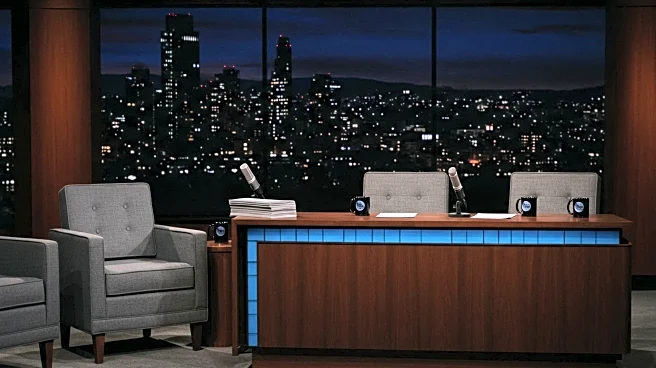What's Happening?
Jimmy Kimmel has publicly disputed reports suggesting that The Late Show With Stephen Colbert was losing $40 million annually before its cancellation. In an interview with Variety, Kimmel criticized the accuracy of these claims, arguing that they overlook significant revenue streams such as affiliate fees. He emphasized that the media often misunderstands the financial workings of television shows. CBS announced the show's cancellation, citing financial reasons unrelated to its performance or content. The decision followed CBS's parent company, Paramount, settling a $16 million lawsuit with President Trump over a 60 Minutes interview. Speculation arose about Trump's influence on the cancellation, given Colbert's critical stance on the administration, but Trump denied involvement, attributing the decision to Colbert's alleged lack of talent.
Why It's Important?
The cancellation of The Late Show With Stephen Colbert marks a significant shift in late-night television, potentially affecting the landscape of political satire and commentary. Colbert's show has been a platform for critiquing political figures, including President Trump, and its end could impact public discourse. The financial aspects highlighted by Kimmel underscore the complexities of television economics, where advertising revenue and affiliate fees play crucial roles. The situation also reflects broader industry trends, where financial viability often dictates programming decisions. Stakeholders in the media industry, including networks and advertisers, may need to reassess their strategies in light of such high-profile cancellations.
What's Next?
CBS's decision to cancel The Late Show may prompt other networks to evaluate their late-night programming strategies, potentially leading to shifts in content focus or financial models. The merger between Paramount and Skydance, approved by the FCC, could further influence programming decisions and resource allocation. As the media landscape evolves, viewers might see changes in the types of shows offered, with potential impacts on political commentary and entertainment. Additionally, the ongoing dialogue between media personalities like Kimmel and political figures such as President Trump may continue to shape public perceptions and media narratives.











